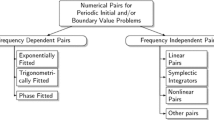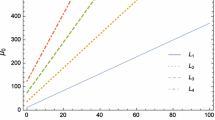Abstract
Higher order multi-point methods are advantageous to solve scalar nonlinear equations because of their speed of convergence. The approximate solution is usually obtained in a few steps, thus saving time and computational effort. In this work, we study the Power Spectrum of the Fourier Transforms of the errors of a well-known family of multi-step Newton method. Firstly, by two numerical examples we observe that as the order p of the methods increases, the Power Spectrum of Low Frequency modes of successive approximations decreases and the Power Spectrum of the High Frequency modes increases until they become almost equal when p become large. We prove this point analytically by showing that the Power spectrum of the Fourier Transforms of the errors of the methods from the error equation is independent of the frequency and the Amplitude of the Power Spectrum tends to zero as p tends to infinity. From there, we attempt to find the best method of this family. We also compare the family with two other families of higher order multistep methods, in terms of order, efficiency index and Amplitude of Power Spectrum. Finally, we conduct more numerical experiments to find the best method of the 3 families.
Similar content being viewed by others
References
Argyros, I.K., Szidarovszky, F.: The Theory and Applications of Iteration Methods. CRC, Boca Raton (1993)
Babajee, D.K.R., Dauhoo, M.Z.: An analysis of the properties of the variants of Newton’s method with third order convergence. Appl. Math. Comp. 183, 659–684 (2006)
Chun, C.: A new iterative method for solving nonlinear equations. Appl. Math. Comp. 178, 415–422 (2006)
Grau-Sanchez, M.: Improvements of the efficiency of some three-step iterative like-Newton methods. Numer. Math. 107, 131–146 (2007)
Kolibal, J.: Importance of convection and damping on rates of convergence for the Lax-Wendroff method. SIAM J. Sci. Comput. 20, 1513–1529 (1999)
Kou, J., Li, Y., Wang, X.: Some modifications of Newton’s method with fifth-order convergence. Comput. Appl. Math. 209, 146–152 (2007)
Kou, J., Li, Y.: An improvement of the Jarratt method. Appl. Math. Comput. 189, 1816–1821 (2007)
Ortega, J.M., Rheinboldt, W.C.: Iterative Solution of Nonlinear Equations in Several Variables. Academic, London (1970)
Thomas, J.W.: Numerical Partial Differential Equations: Finite Difference Methods. Springer, New York (1995)
Traub, J.F.: Iterative Methods for the Solution of Equations. Prentice Hall, Englewood Cliffs (1964)
Wait, R.: The numerical Solution of Algebraic Equations. Wiley, New York (1979)
Weerakoon, S., Fernando, T.G.I.: A variant of Newton’s method with accelerated third-order convergence. Appl. Math. Lett. 13, 87–93 (2000)
Author information
Authors and Affiliations
Corresponding author
Additional information
The work of the first author is partly supported by Tertiary Education Commission and University of Mauritius.
Rights and permissions
About this article
Cite this article
Babajee, D.K.R., Dauhoo, M.Z. Spectral analysis of the errors of some families of multi-step Newton-like methods. Numer Algor 52, 25–46 (2009). https://doi.org/10.1007/s11075-008-9256-x
Received:
Accepted:
Published:
Issue Date:
DOI: https://doi.org/10.1007/s11075-008-9256-x
Keywords
- Multi-step Newton method
- Order of convergence
- Discrete Fourier transform
- Power spectrum
- Low frequency errors
- High frequency modes
- Parseval theorem
- Amplitude of the power spectrum
- Mean power spectrum




